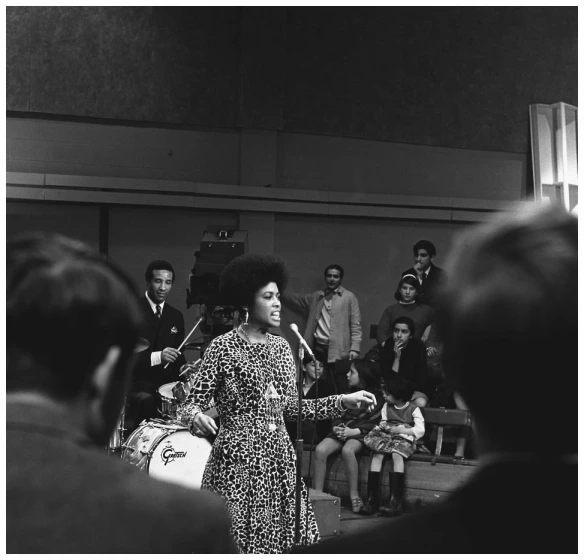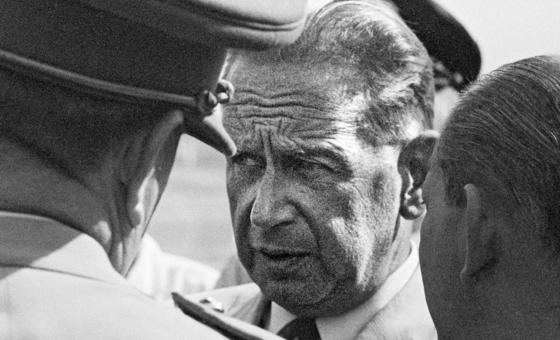Who would have thought that Khrushchev’s thumping fist would act as the drumbeat to Louis Armstrong’s trumpet? And this from a Soviet leader who once dismissed jazz as "stomach gas."
Director Johan Grimonprez employs music’s universal language to illuminate its profound, subliminal entwinement with politics in a way few have done before. 'Soundtrack to a Coup d’État' reveals the rhythm of political discord, a chaotic harmony both beautiful and dissonant.
Wednesday, November 27th we're screening this film at Melkweg, Amsterdam in collaboration with Africafdelic: Click here for tickets.
The inspiration for this documentary comes from February 1961, when singer Abbey Lincoln and drummer Max Roach crashed the UN Security Council to protest the murder of Patrice Lumumba, the first prime minister of the newly independent Congo.
This event encapsulated the interdependency between music and political resistance—a theme that runs through the veins of the film and pulses like a drumbeat… literally. Grimonprez gives the film a dual rhythm by meticulously editing sequences of harsh rhetoric over impassioned melodies. As Roach’s drums clash with speeches on colonialism and independence, the sound becomes more than just a backdrop.
America’s weapon was a blue note in a minor key.
Six months earlier to the ambush by Roach and Lincoln, sixteen newly independent African countries had joined the United Nations, shifting power away from former colonial nations and creating a political crisis. As Cold War tensions hit new highs, Soviet leader Nikita Khrushchev made headlines by banging his shoe at the UN, denouncing America’s racial inequality and the UN’s role in Congo’s crisis, and calling for global colonisation. To maintain control over Congo’s valuable uranium—a critical Cold War resource—Belgium partnered with the Eisenhower administration, which feared losing access.
Throughout the documentary, Grimonprez exposes music as a paradox: a weapon and a shield, a distraction and an expression. Artists like Louis Armstrong and others were sent to the Congo on tours as a “cultural ambassador” to Africa to win favour, unknowingly making him a cover for CIA activities in Congo.
The emotional resonance the music brings to this narrative is profound. From the fury of Roach’s solos to the sorrowful solos of Simone, the music isn’t just an accompaniment but an emotional catalyst, showcasing the expression and suppression of freedom.
Scenes stripped of music add a haunting layer to the narrative. In one powerful moment, we see John Coltrane's anguished face as he blows into his saxophone—yet no sound emerges. The silence is palpable, and his expression conveys a profound, inescapable pain, unsoftened by melody or rhythm.
Soundtrack to a Coup d’État unfolds through the perspectives of voices like Andrée Blouin, a Central African Republic women’s rights activist; Irish diplomat Conor Cruise O’Brien, ; In Koli Jean Bofane, the Belgian-Congolese writer; and none other than Khrushchev himself. Accompanied by boasting legends such as Louis Armstrong, Dizzy Gillespie, Abbey Lincoln, Max Roach, Nina Simone, Miriam Makeba, John Coltrane, and Duke Ellington musically mirroring the film’s turbulent narrative.
As instruments clash, harmonise, and rise, so too does the chaotic narrative of a continent caught in the grip of Cold War politics, cementing it as a masterpiece of interconnected music and political tension. Add Fidel Castro’s unexpected cameo, and it’s clear that Grimonprez has crafted a cinematic tour de force, bringing to life the raw power, beauty, and struggle embedded in jazz and African self-determination alike.
Steppin' Into Tomorrow stands with artists & labels and encourages listeners to support them by buying their music directly from Bandcamp. If you've enjoyed this article, please consider subscribing to our monthly newsletter to stay in the loop.



















